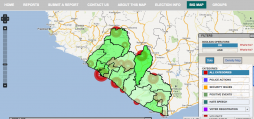2011
Posted by AnneryanHeatwole on Dec 03, 2011
On November 8, 2011, the Liberian President Ellen Johnson Sirleaf won her re-election campaign following a contentious runoff vote. In the October 11 general election, neither of the top two presidential candidates secured a majority vote –Johnson Sirleaf received 43.9% of votes and opposition candidate Winston Tubman received 32.7% of the nation’s votes. Johnson Sirleaf and Tubman were scheduled to participate in a November 8 runoff election; however, Tubman boycotted it saying that the first elections had been unfair; a claim international election observers dispute. As the only candidate, Sirleaf won the runoff despite a low 37.4% of eligible voters coming out for the second round (compared to more than 70% for the first round).
In light of the election’s tumult, MobileActive.org spoke to the National Democratic Institute and Ushahidi Liberia to learn more about their respective work in the country encouraging transparency and fairness through election monitoring and citizen reporting.
The National Democratic Institute and Ushahidi in the 2011 Liberian Elections
Elections can be rigged in many ways, and voter fraud is varied. For instance, ballots can be changed or manipulated, voters can be influenced through intimidation or bribes, violence can shut down polling stations, or ballots can be changed after the election before the results are announced. Technical difficulties can also influence an election by preventing voters from casting their votes or having those votes accurately counted; difficulties could include long lines, failure to open a polling place on time, or a lack of necessary supplies.
| Technology in the 2011 Liberian Elections: Mobiles, Monitoring, and Mapping data sheet 1787 Views |
| Countries: |
Liberia
|

